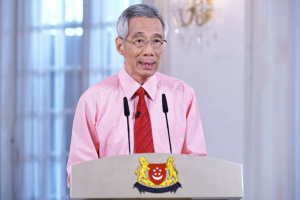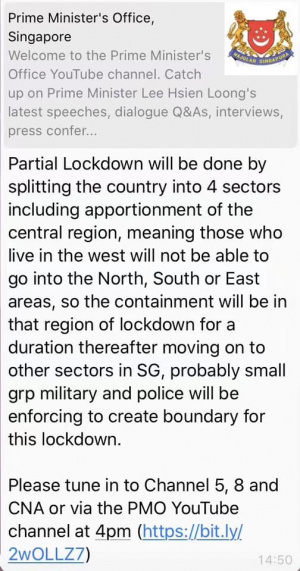COVID-19: False partial lockdown announcement
This entry is a part of Wiki.sg's coverage on the evolving COVID-19 situation in Singapore. For more COVID-19 stories, click here. For a list of COVID-19 fake news, click here.
On 3 April 2020, Prime Minister Lee Hsien Loong announced a month-long "circuit breaker" on national television.[1][2] The stay-home measures for businesses and schools were rolled out on 7 and 8 April 2020 respectively. PM Lee has not addressed the nation since then until 21 April 2020.[3] However on 17 April 2020, false news of an impending announcement circulated on messaging channels.

Origins of the rumour
On 17 April, a rumour alleging that PM Lee would be making a COVID-19-related announcement later that day surfaced in messaging chats.[4] Not knowing that this was fake news, some individuals interpreted these measures as a "partial lockdown" to contain the spread of COVID-19 in Singapore.[5] There were two main claims made in the message.
Claim 1: Official address by PM Lee on 17 April
The message alleged that PM Lee was scheduled to speak about the COVID-19 situation later that day (17 April).
Claim 2: "Partial lockdown" in Singapore
The details of the "partial lockdown" was stated as such:[6]
(i) Singapore would supposedly be divided into four segments - North, South, East and West.
(ii) Residents belonging to one region would not be allowed to travel to another.
(iii) These boundaries would be enforced by military personnel.
Claim 1: Debunked by Gov.sg
The first claim was promptly refuted by Gov.sg on their Telegram channel.[7] Gov.sg's Telegram and Whatsapp channels are mediums for the government to release official updates instantly and on a larger scale. These channels are managed by the Ministry of Communications and Information (MCI).[8] The Gov.sg message clearly stated that PM Lee was not addressing the public on 17 April 2020.
Politician Tan Chuan-Jin reposted Gov.sg's confirmation on his Facebook page and expressed his dismay over this case of fear-mongering.[9]
Claim 2: Debunked by the Ministry of Health (MOH)
The Ministry of Health debunked the second claim on their official website.[10] No such lockdown measures were announced or implemented by the Singapore government in the days following 17 April 2020.
References/ Citations
- ↑ "In full: PM Lee's address on enhanced measures to deal with COVID-19 situation in Singapore". Channel News Asia. April 3, 2020. Updated on 6 April 2020. Accessed on 21 April 2020.
- ↑ “COVID-19 circuit breaker: Heightened safe-distancing measures to reduce movement”. Gov.sg. April 3, 2020. Accessed on 20 April 2020.
- ↑ "PM Lee to address nation at 5pm, provide update on COVID-19 situation". Channel News Asia. April 21, 2020. Accessed on 21 April 2020.
- ↑ “COVID-19: Rumours that PM Lee will announce tighter travel restrictions on Friday are untrue, says Government”. Channel News Asia. April 17, 2020. Accessed on 20 April 2020.
- ↑ “Covid-19: Government debunks rumour of 'partial lockdown' in Singapore”. Today. April 17, 2020. Accessed on 20 April 2020.
- ↑ Yong, Clement. “Coronavirus: PM Lee 'announcement' that S'poreans can't travel beyond the area they live in is fake, says Govt”. The Straits Times. April 17, 2020. Accessed on 20 April 2020.
- ↑ Ng, Lucia. “Messages Of S’pore Lockdown & PM Lee’s Address Are “Completely Untrue”, Says Gov.sg”. MustShare News. April 17, 2020. Accessed on 20 April 2020.
- ↑ "GOV.SG LAUNCHES NEW CHANNELS TO KEEP THE PUBLIC INFORMED ABOUT COVID-19". Ministry of Communications and Information. April 2, 2020. Accessed on 21 April 2020.
- ↑ Tan Chuan-Jin. “Help share. The stuff going round is pure nonsense…”. Facebook. April 17, 2020. Accessed on 20 April 2020.
- ↑ “CLARIFICATIONS ON MISINFORMATION REGARDING COVID-19”. Ministry of Health. April 17, 2020. Accessed on 20 April 2020.
